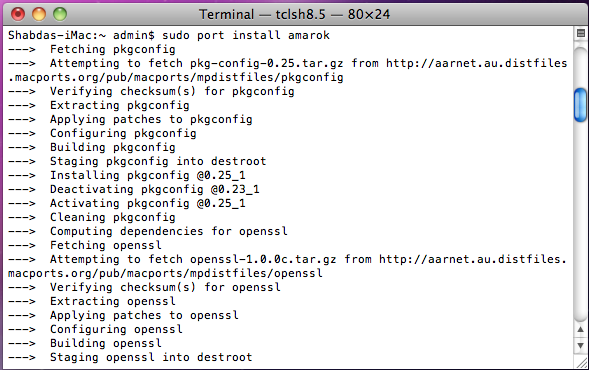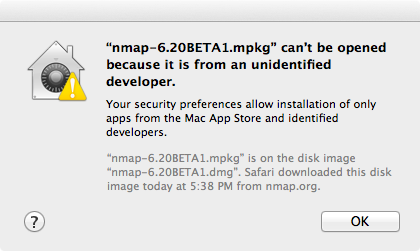
- PORT INSTALL FOR MAC INSTALL
- PORT INSTALL FOR MAC UPDATE
- PORT INSTALL FOR MAC SOFTWARE
- PORT INSTALL FOR MAC CODE
- PORT INSTALL FOR MAC DOWNLOAD
The most popular option is -enable-python-libs to build the Python Client Module.
PORT INSTALL FOR MAC INSTALL
If this is the first time run with -i to install the missing files autoreconf -i Do the usual build steps sudo port install gitĬheck out the git repo with the following command: git clone ola
PORT INSTALL FOR MAC DOWNLOAD
If you don’t have git yet, you’ll need to install it, either through Macports or Brew, or download an installer. You can either download a tarball, or pull the latest version from the git repo Tarballĭownload the most recent tarball from Github. Make sure the port name matches the one you installed in the step above. You can find that out by running: port contents py27-protobuf You may need to tweak the PYTHONPATH depending on where the Python protobuf was installed.

Set $PATH to point to something sane, and fix some other environment variables: export PATH="$PATH:/usr/local/bin/"Įxport PKG_CONFIG_PATH="/opt/local/lib/pkgconfig:$PKG_CONFIG_PATH"Įxport PYTHONPATH=/usr/local/lib/python2.7/site-packages/:/opt/local/Library/Frameworks/amework/Versions/2.7/lib/python2.7/site-packages Remember which version you install because you’ll need it in the next section. You can find that out by running python -version You may need to change which Python protobuf port you install based on the version of Python on your system. sudo port install pkgconfig cppunit protobuf-cpp libmicrohttpd libusb py27-protobuf Then run the following command to download and build the dependencies.
PORT INSTALL FOR MAC UPDATE
Once you have MacPorts installed, first update its list of packages by running the following command. The easiest way is to install the dependencies using MacPorts. You can use other compilers but that’s outside the scope of this tutorial.
PORT INSTALL FOR MAC CODE
If you find this file in your directory structure it means you have an outdated version of PortAudio.There is a fully packaged version of OLA you can just install, for both MacPorts and Homebrew (sudo brew install ola), which is much easier than the process below if you don’t want to make local code changes. This is no longer supported because you can build universal binaries from the standard configure routine. Note, there used to be a special makefile just for darwin. See "src/hostapi/coreaudio/notes.txt" for more details on these features. This file contains some special, mac-only features relating to sample-rate conversion, channel mapping, performance and device hogging.

How you do so depends on your build.įor additional, Mac-only extensions to the PortAudio interface, you may also want to grab "include/pa_mac_core.h". You will need to add the following frameworks to your XCode project:įor gcc/Make style projects, include "include/portaudio.h" and link "libportaudio.a", and use the frameworks listed in the previous section. If not you can simply add it to the top level folder of the project. Then drag the "libportaudio.a" file into your XCode project and place it in the "External Frameworks and Libraries" group, if the project type has it. To build a non-universal library for the host architecture, simply use the –disable-mac-universal option with configure. Note that the first option may require an extremely recent version of PortAudio (February 5th '08 at least). use lipo(1) on whatever part of the library you plan to use.

If you want a "thin", or single architecture library, you have two options:īuild a non-universal library using configure options. This includes 64-bit versions if you are compiling on 10.5, Leopard. The default described above is recommended as it is the most supported and tested however, your needs may differ and require other options, which are described below.īy default, PortAudio is built as a universal binary. There are a variety of other options for building PortAudio. The result of these steps will be a file named "libportaudio.dylib" in the directory "usr/local/lib/".īy default, this will create universal binaries and therefore requires the Universal SDK from Apple, included with XCode 2.1 and higher. (Note from Phil: I had to do "sudo make install" after the command above, otherwise XCode complained that it could not find "/usr/local/lib/libportaudio.dylib" when I compiled an example.)
PORT INSTALL FOR MAC SOFTWARE
You do not need to do "make install", and we don't recommend it however, you may be using software that instructs you to do so, in which case you should follow those instructions.


 0 kommentar(er)
0 kommentar(er)
